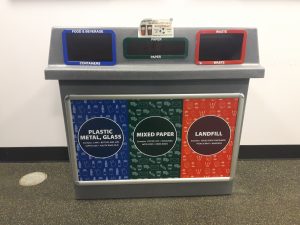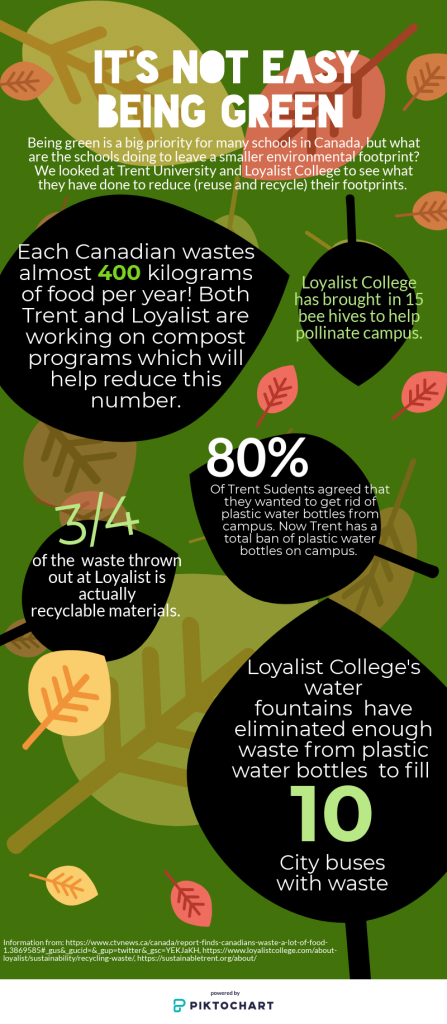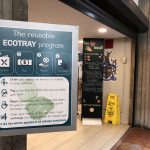By Becky McMullen [5], Lori-Anne Little [6], and Sarah Law [7]
BELLEVILLE — It’s not easy being green, but Trent University and Loyalist College are taking big steps to make environmentally friendly campuses.
Sustainability has been a major focus for Trent since its founding in 1964. “There were elements of sustainability built into the initial vision for Trent, which I think is pretty progressive for the early ’60s,” said Trent sustainability co-ordinator Shelley Strain.
Even before 2007, when the the university hired Strain, who is the first official sustainability co-ordinator at Trent, the university already had many well-established environmental programs, she said.

How the EcoTray program at Trent University works. Infographic by Sustainable Trent
The university’s cafeteria offers reusable and washable EcoTrays for a one-time cost of $5. (By comparison, students pay $1 each time they get a traditional take-away container.) Students return the EcoTray to get it washed, and receive an exchange card so they can get another one free the next time they eat. The program was introduced about four years ago.
“Within one semester, there was a dramatic change,” to the point where almost everyone was using the EcoTray, Strain said – “which is really impressive.”
Trent also has a successful composting program. Initially the composting process was done on campus, and the waste decomposed at its own natural rate. The program was later changed to take the compost offsite and put it through machines that speed up the process.
Loyalist College has taken inspiration from some of Trent’s programs and used the ideas to reduce the amount of waste it produces, according to Jessica Spooner, Sustainable Loyalist’s co-ordinator. One of the programs Loyalist introduced was the removal of waste bins in classrooms. The logic was that this would force students to find one of the many Tri-Bins – bins for trash, paper and plastics – that are around the school, and once they saw the recycling options they would choose that instead.
“We’re trying to get people to bring their waste to these central areas and then sort them there,” Spooner said.
Sustainable Loyalist is also placing different recycling bins in one of the college’s residences. Instead of having one recycling bin in each apartment, a second one is being added to make it easier to sort recyclables. The hope is that this will decrease the amount of recyclables that end up in the trash; one of the issues on campus is that 80 per cent of waste sent to landfill is recyclable material.

The Tri-Bins around Loyalist College make it easy for students to recycle and understand what waste goes into which bin. Photo by Becky McMullen, QNet News
The point of all this is not to compete with other schools to be the most environmentally friendly, said Spooner, but to work together to help the planet and reduce the carbon footprint.
The provincial government has set a target for the diversion rate – the amount of waste that gets redirected from landfills through composting, recycling and reuse – of 60 per cent. Sustainable Loyalist wants to surpass that goal by 2020, Spooner said.
One plan is to replace decorative plastic plants around the school with living plants to make the air fresher and help students focus and relax – as has been done in the college’s Link Lounge, a study area that has a wall of live plants.
Sustainable Loyalist has also brought 15 beehives to campus to help with plant pollination.
“They’re honeybees, and their purpose is to help with the naturalization on our campus,” Spooner said.







